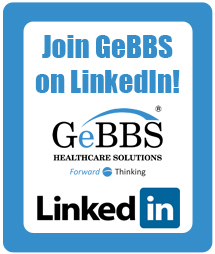Credit balances are simply a part of everyday life in the delivery of healthcare services. Unresolved credit balance accounts can distort the profitability of a healthcare facility and foster financial risks. Researching and correcting posting errors, duplicate payments, overpayments, and misapplied credits are not only time consuming, but also expensive. However, failure to address these credit balances in a timely manner may result in missed billing opportunities, and when associated with government payers, may also bring compliance risks and penalties. Following are 10 best practices to help you with your credit balance resolutions:
Read MoreGeBBS Healthcare Blog
Tags: Revenue Cycle Management (RCM), Accounts Receivable (A/R), Credit Balance Resolution
While credit balances are unavoidable, identified overpayments should be retained for as short a time as possible. Risks associated with unresolved credit balances include: Medicare/Medicaid penalties, class action litigation, misstated revenues, lost payment opportunities and wasted time and resources.
There are several common causes of credit balances: insurer overpayments or duplicate payments, coordination of benefit conflicts, incorrect payment rates in billing systems, insurer refusal to accept provider-identified overpayment, incorrect upfront collections (coinsurance/deductibles), charge corrections, unintentional, erroneous over billing, and uncashed refund checks.
To assist facilities with dealing with credit balances, the Office of Inspector General (OIG) has made general recommendations in its compliance Program Guidance for Third Party Billing Companies:
Tags: Revenue Cycle Management (RCM), Credit Balance Resolution
Top 10 Reasons Why You Should Outsource Your Revenue Cycle Activities
Posted on Thu, Mar 19, 2015 @ 12:12 PM
In today’s healthcare environment of shrinking reimbursements, due to governmental mandates and Medicare policy changes, the importance of maintaining a healthy revenue cycle is second only to providing the best patient care possible. Without an adequate margin there can be no medical mission.
Read MoreTags: Business Process Outsourcing (BPO), Revenue Cycle Management (RCM), Medical Coding, Affordable Care Act, Insurance Billing Solutions, Offshore Medical Billing, Offshore Medical Coding, Medical Billing BPO, Offshore Revenue Cycle Management, Remote Medical Coding, Medical Coding BPO
The introduction several years ago of the ERA (Electronic Remittance Advice) created a quantum leap in the healthcare billing arena by providing an improvement to the traditional, paper-based EOBs. Astonishingly, many providers have not taken advantage of this revolutionary change. It has been estimated that even today only 46 percent of the claims are processed electronically, while the remaining 54% claims are processed in the traditional paper-based method. However, the Affordable Care Act (ACA) mandated that all healthcare plans adopt and support ERA operating rules before January 1, 2014.
Read MoreTags: Data Analytics, Revenue Cycle Management (RCM), Electronic Remittance Advices (ERAs), Explanations Of Benefits (EOBs), Accounts Receivable (A/R), Insurance Billing Solutions
Why Switch to ERAs?
In addition to inefficient processing and high administrative costs, paper EOBs contribute to a provider’s

struggle with physical storage and document inaccessibility. Rummaging through paper archives as a means to investigate and manage secondary claims does not promote efficiency.
Even worse, your medical practice or hospital may miss out on the opportunity to harness the power of big data. In the absence of a readily accessible and centralized data warehouse, providers forfeit the opportunity to effectively analyze their payments and denials in hopes of making smarter business decisions.
How ERA Will Benefit Your Practice?
ERAs were created to handle increasing transaction volumes, complex compliance issues and high administrative costs. ERAs alleviate the tedious process of manually entering, checking and posting payments by automating processes and accelerating the revenue cycle.
Tags: Data Analytics, Revenue Cycle Management (RCM), Electronic Remittance Advices (ERAs), Explanations Of Benefits (EOBs)
It is no secret that the healthcare industry is burdened with costly administrative processes. A good example of this are paper explanation of benefits (EOB) forms that have been estimated to cost nearly $18,600 per physician per year in administrative fees.
Read MoreTags: Revenue Cycle Management (RCM), Electronic Remittance Advices (ERAs), Explanations Of Benefits (EOBs), Affordable Care Act
Where Should Patient Access Management be Located within the Organization?
Read MoreTags: Revenue Cycle Management (RCM), Patient Access Management
With all of the changes in healthcare reimbursement policies and the influx of high-deductible patients, healthcare providers need to shift their patient access management strategies to meet these new challenges. No longer can the registration process be looked upon as a simplistic completing of forms and getting the patient into a bed. Today's patient access professional must be capable of highly skilled worksuch as reviewing referrals, obtaining authorizations, verifying eligibility, determining the patients’ willingness and ability to pay, requesting payment at time of service and arranging sophisticated payment schedules to ensure collection of revenue for services rendered.
Tags: Revenue Cycle Management (RCM), Patient Access Management, Insurance Billing Solutions
Healthcare consumerism is going to be an important factor in the new healthcare financial environment where many patients are going to be responsible for a large portion of their healthcare costs. Consumer self-service is already becoming common place in healthcare today. Access to healthcare kiosks and patient portals will become an expectation in patients’ healthcare delivery processes. Allowing healthcare consumers to research costs, schedule appointments, receive online statements and make electronic payments are just some of the options consumers are demanding.
Tags: Revenue Cycle Management (RCM), Patient Access Management, Insurance Billing Solutions
Healthcare Financial Professionals Seek New Ways to Rescue Revenue Cycle Management
Posted on Mon, Oct 06, 2014 @ 10:59 AM
Business pressures are forcing healthcare financial managers to re-evaluate their present revenue cycle management solutions, and look to the next generation of solutions for answers to their financial woes. Shifting payment models, new regulations and healthcare reform are forcing healthcare leaders to redirect previously launched budgets, priorities and strategic plans to assess if new solutions can rescue them from imminent financial catastrophes.
Tags: ICD-10, Revenue Cycle Management (RCM), Healthcare Revenue Billing, Accounts Receivable (A/R), Accountable Care Organizations (ACOs), Affordable Care Act






